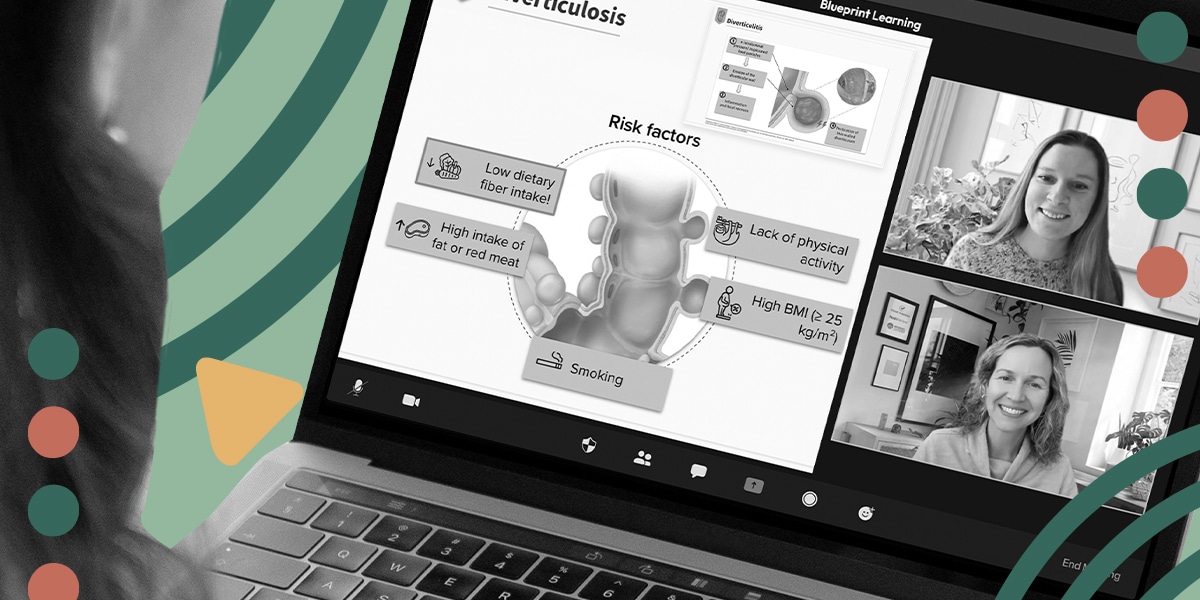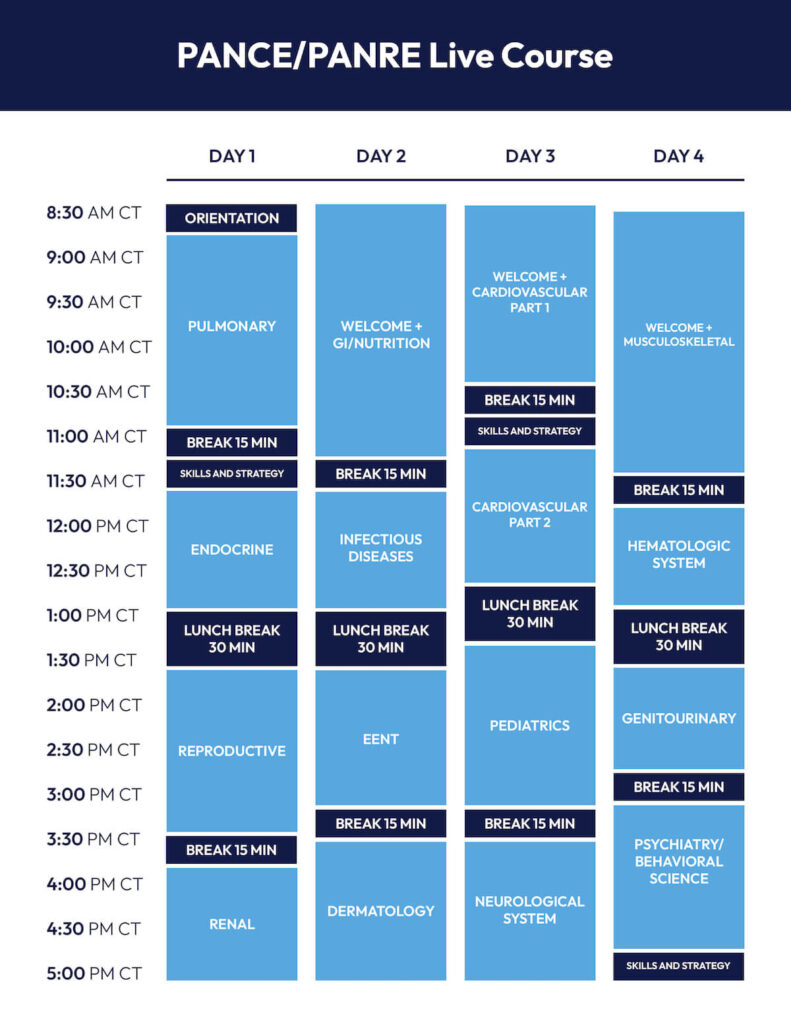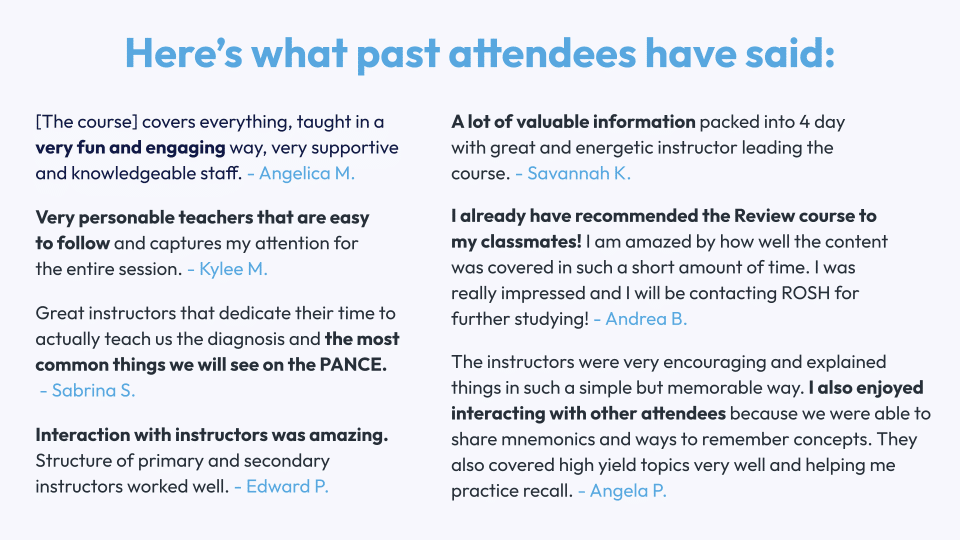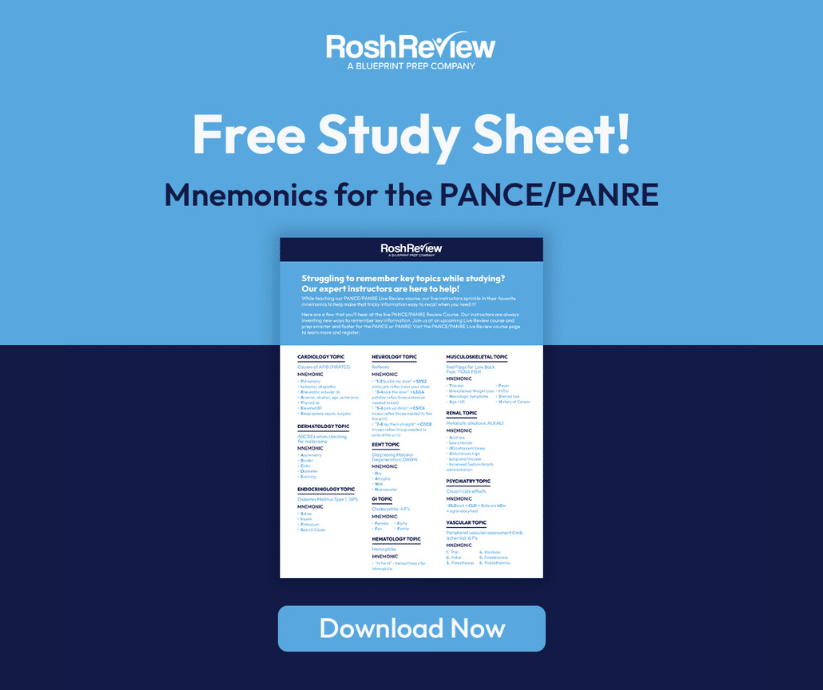Take A Look Inside the Live PANCE/PANRE Review Course

If you’re approaching your PA certification or recertification exam, you may be looking into your options for a review course. Maybe you’ve been considering the live PANCE/PANRE review course from Rosh Review and Blueprint Test Prep, and still have some questions before signing up!
As a follow-up to our previous post, “Introducing the Newest Live PANCE Review Course,” below is an interview with Sara Lewis, MPAS, PA-C, one of the instructors for the course. We’ll go over some common questions about the course experience itself, including the structure, content, and more.
All About the Live PANCE/PANRE Review Course: An Interview with Sara Lewis, MPAS, PA-C
Hannah:
Hi Sara, nice to meet you! Thanks for joining me today. Can you start by introducing yourself?
Sara Lewis:
Hi, my name is Sara Lewis. I’m a hospitalist physician assistant. I’m currently living in Connecticut and graduated from Bryant PA school in March 2020, so right as the pandemic hit!
I’ve been working as a hospitalist PA for three and a half years now, and about two years ago, I was interested in getting back to teaching. I was looking online for something that might fit into my full-time schedule when I stumbled on Blueprint during a job search. It was just sort of lucky!
When I started at Blueprint, I was doing one-on-one PA tutoring, but when the PANCE/PANRE course launched in May, I was asked to come on and start instructing with our other team members.
Who leads the course?
Hannah:
Just curious, how many instructors are in the course?
Sara Lewis:
There are two instructors for each course, and one person that helps with chat support. There are about 12 to 14 instructors total with more joining each course.
During the course in each lecture, one person acts as the primary instructor, one person acts as the secondary instructor, and we even have another instructor acting as chat support for our larger classes to help answer questions!
For a closer look inside the course, check out this short video featuring a few of our instructors:
Is it equally applicable for both PANCE/PANRE?
Hannah:
So, second question—who was this course designed for? I know it’s called a combined PANCE/PANRE prep course. Is it equally applicable to people studying for either exam?
Sara Lewis:
I would say it was designed for everyone. The course fully prepares you for every topic that’s going to be on your PANCE or PANRE exams.
It’s a great refresher course on every high-yield topic that’s going to be on your exam. So if somebody is ramping up to their PANCE exam, it’s a great course to take, especially those who need a refresher on classroom learning after a full year of clinicals.
It’s also great for anybody who’s failed their exam in the past. I’ve spoken to a couple of people that failed the PANCE once or twice who just needed more focused teaching time and this course was a great resource for them.
In terms of the PANRE learners, they’ve been practicing for the better part of a decade and it’s probably been a while since they took a sit-down exam. This course is very helpful for PANRE learners, especially with the focus on more specific topics that aren’t always reviewed in daily life, like hematology, rheumatology, renal, etc. It’s a nice general review, whether you’re taking the PANRE or the PANRE-LA.
You can also get CME credits with this course. So if someone is in a subspecialty and wants to use their annual CME credits for a general review course, this can also be a great option for them as well.
What is the structure of the course?
Hannah:
That’s super helpful! What would you say is the overall structure of the review course?
Sara Lewis:
The course is typically either four or five days long depending on the month with three or four topics covered each day. For example, I taught yesterday and we did musculoskeletal in two sections because it’s such a big topic, followed by GU, heme, and psych. So you’ll have four big topic blocks that you’ll go over each day.
You’ll also have a break between all of those blocks. We give 15-minute or 10-minute breaks between each section, and then have a lunch break, which is 30 minutes at some point during the day.
If you prefer a visual, here’s a sample schedule:

They’re long days, but you’re learning every topic that could be on your PANCE or PANRE over a four- (or sometimes five-) day period. Plus, it helps build endurance for your actual exam day!
What are some of the topics covered in the course?
Hannah:
What are some of the topics you cover? Is there a benefit of having an instructor to help you learn the material, instead of self-guided studying?
Sara Lewis:
I would think of this course like having a personal trainer when you’re working out. Instead of trying to figure out what to study next and trying to make a study plan yourself, we teach you the highest-yield topics in entirety.
The course covers every high-yield topic that’s going to be on your exam. We go over the pathophysiology, epidemiology, risk factors, physical exam findings, lab results, imaging tests, treatment and preventions for each topic covered (while also keeping the class fun)!
In a live review course, we can answer questions as they come up, give our tips, tricks, and mnemonics (see below) for remembering difficult topics, with special focus on commonly-asked questions.
Having this blueprint is super helpful with studying rather than trying to do it all yourself!
Want a sneak peek into the mnemonics we use in the live PANCE/PANRE review course? Get the FREE download to reference throughout your exam prep!
What are some other skills you learn in the course?
Hannah:
Do you help students with any test-taking strategies in addition to the course material?
Sara Lewis:
We also have some skills and strategy sessions. We talk about question strategy, how to approach a question, common mistakes students make, etc.
We do a lot of questions together, too—we’ll have students answer pop-up questions or multiple choice questions throughout each lecture.
Can I take this course and be ready for exam day right away?
Hannah:
Is there anything else that students should be doing to prepare for their exam in addition to the course?
Sara Lewis:
As much as I love this course, it’s not the only thing you should be doing prior to your exam. In your own time after the course it’s still important to be studying and doing questions on your own.
While it’s great to know the content going into your exam, make sure you also have exam endurance and are comfortable with the exam structure. The course is a great supplement to your studies, but make sure you use what we give you and study in your own time too, with either a Qbank or review book.
What additional resources do you get with the course?
Hannah:
Does the course include any additional resources, like performance analytics access or practice exams?
Sara Lewis:
Yes, so you’ll get access to all of the slides we’re using as a handout, which includes all the information we cover in the course. On the handout there’s room for you to take notes as we’re going through it.
We, as instructors, pride ourselves in not just being monotonous and reading off the slides. Each instructor is dynamic and we’re constantly giving additional information and facts throughout each lecture. Having that handout and your notes is extremely helpful and something you can look back on later. All the sessions are also recorded and given to you for 60 days to come back to listen to later if needed.
This course also gives you TONS of questions. For the PANCE, you get 570 Rosh Qbank questions and for the PANRE, depending on whether you want CME or not, it’s about 970 Qbank questions. This course is very helpful because if you’re looking for learning with questions, we’re going to be flooding you with questions. We have everyone do Rosh questions daily as a check-in.
We also have a pre-course exam to see where your knowledge is prior to the review. Then at the end of the course, we give you a full-length PANCE or PANRE exam you can take to get a good understanding of where you’re at score-wise and what you should focus on in the rest of your studying.
Lastly, you’ll get access to your performance analytics dashboard through Rosh to help you key in on what you might want to focus your last bits of studying on. In the dashboard, you’ll get a projected PANCE score, you get to see how you do compared to a national average and it really breaks it down by topic. So in musculoskeletal, if the national average is 70 for example, and you’re maybe scoring in the 62 range, that’s a topic that you should focus on in your own time prior to your exam.
Do you get 1-on-1 support?
Hannah:
Perfect. And I did have a follow up question, because the course is so short, I’m curious if there is any 1-on-1 support throughout it?
Sara Lewis:
I would say a huge benefit of this course is we have multiple people teaching so the course feels dynamic with high energy, while we also have someone available to interact with everyone in the chat. We’re able to, in real-time, interact with the students by answering questions, getting feedback, focusing on topics for a little longer if needed, etc.
We also often have an additional support person in the chat just to help us answer questions. I also hang around for a few minutes during the breaks and answer individual questions.
There’s certain areas of the course that we dedicate just to answering individual questions as well. When we finished up the course yesterday, for example, we wrapped up by talking about the exam. And I was probably sitting on Zoom for a good 20 to 30 minutes after the course ended answering individual questions. Things like, “I failed my exam. What should I focus on?” Or, “I really have a hard time making a study schedule. What do you recommend?” We make time to answer all those individual questions as well.
And since I’m also an individual tutor, if you find yourself still struggling and need extra one-on-one support, you can always sign up for PA tutoring, too.
What else should I know about this course?
Hannah:
Amazing. So before we wrap up, do you have any advice you would give to somebody who’s debating whether or not they should take the course?
Sara Lewis:
I would let them know that this course is actually really fun! All the instructors know each other really well at this point. We’re constantly joking around, having fun, and sharing all of our weird mnemonics.
This isn’t a course where we’re monotonous and reading off the slides. We’re having so much fun—we’re very engaged, we love interacting with all the participants through the chat and we see people making jokes back to us…it’s really a good time.
And honestly, I wish this course was available when I was getting ready for my PANCE exam. It would have definitely taken away a lot of the stress and anxiety I had. I truly could not recommend this more—I tell all of my friends they should recommend it to anyone they know going through PA school, coming up to the PANCE/PANRE exam, or anyone looking for an amazing and fun general review course!
Don’t just take it from me, though, check out these testimonials from our students who have already taken the live PANCE/PANRE review course!

Ready to sign up? Courses are offered every month, so you could be part of the next cohort! Sign up for the live PANCE/PANRE review course today and get a 100% Pass Guarantee for your upcoming exam. We’re rooting for you!
Rosh Review is the leading Qbank provider for PA programs across the United States. Whether you’re a pre-PA student or PA-C, Rosh Review has something for you along your PA journey. Start a free trial today!






Comments (0)